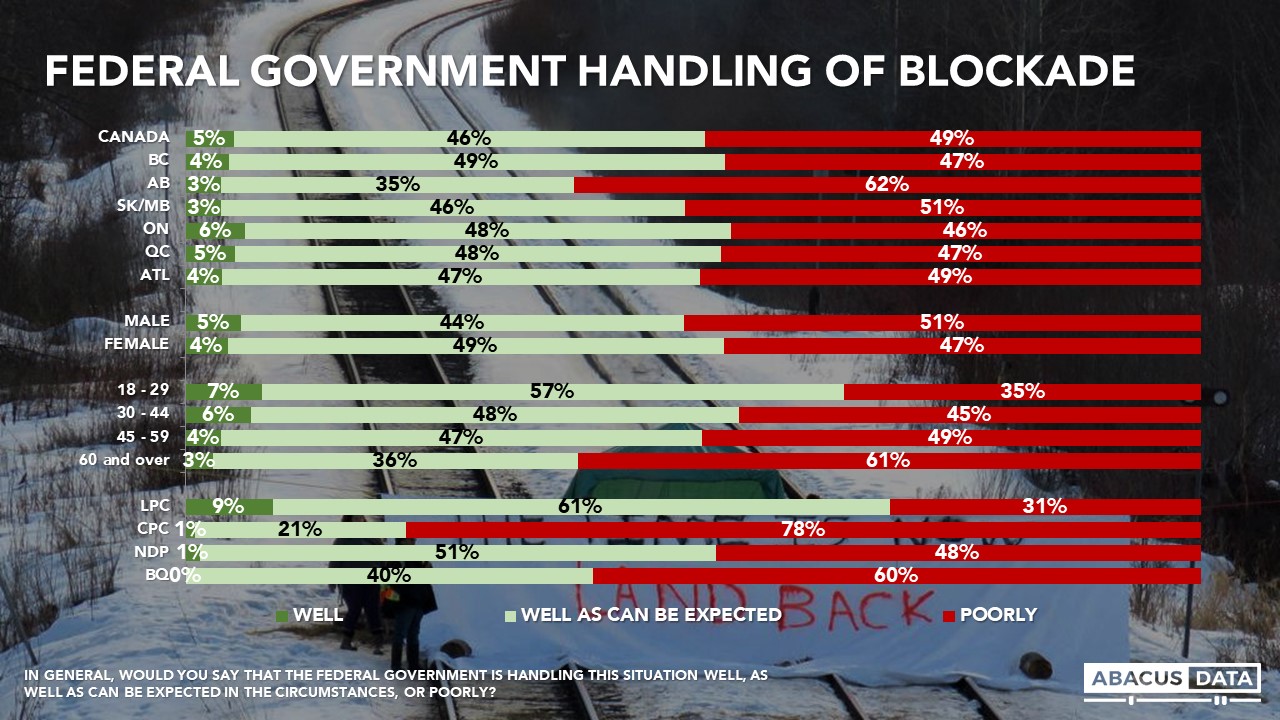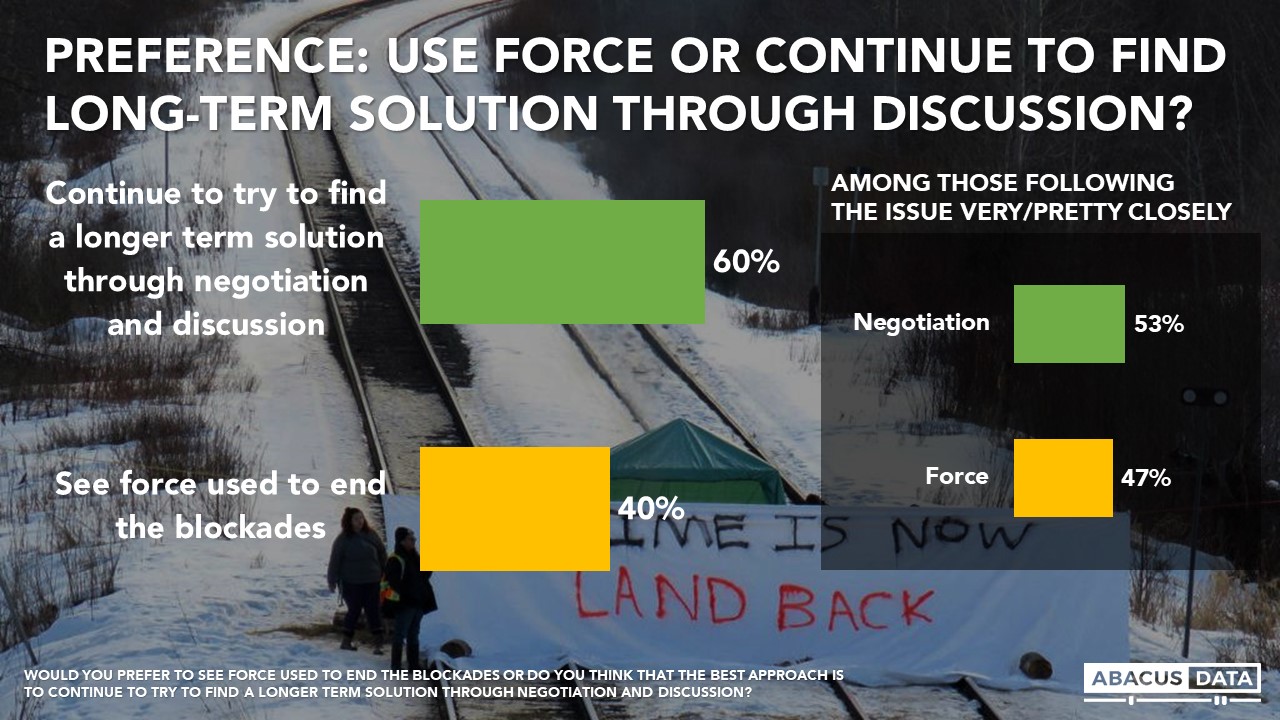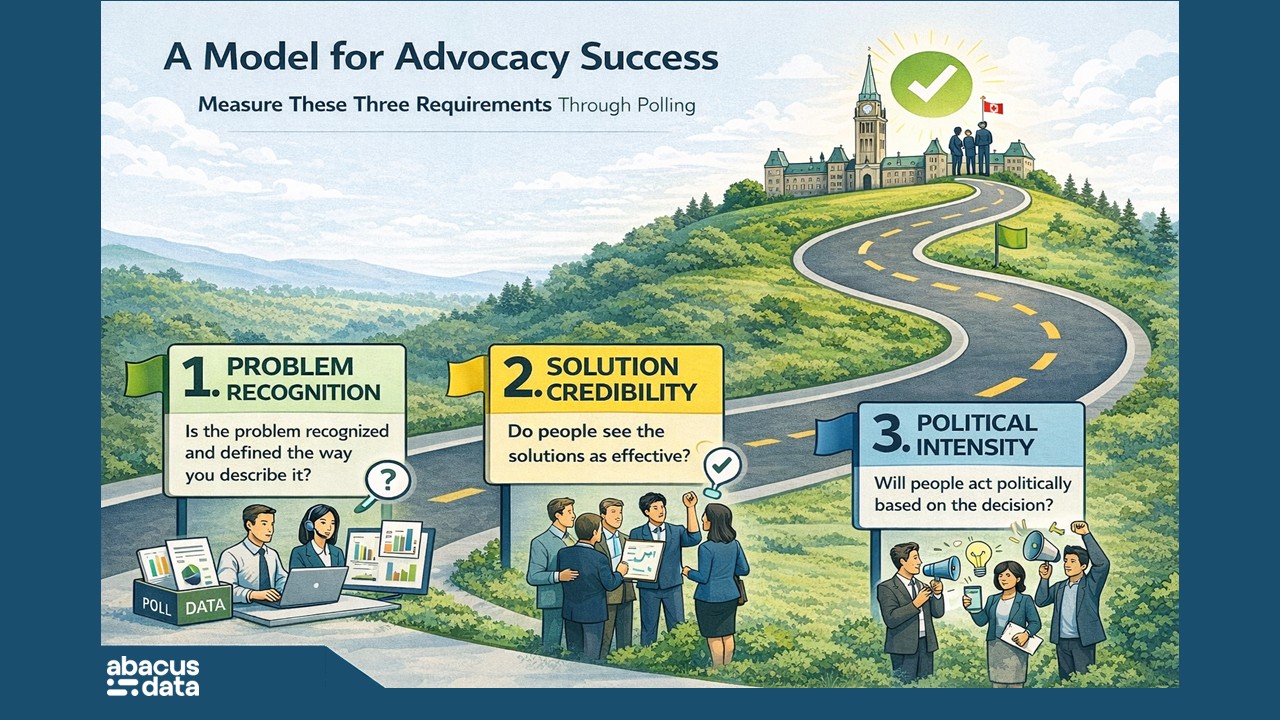Abacus Data Bulletin: Canadians prefer negotiation over force but that’s not the same as support for blockades
March 5, 2020

Abacus Data Bulletins are short analyses of public opinion data we collect. For more information or media interviews, contact Bruce Anderson or David Coletto.
APPROVAL OF FEDERAL GOVERNMENT
Today 33% approve of the Trudeau government performance, 20% are on the fence, and 47% disapprove. Approval is down 4 points since last month and about equal where it was a year ago.

BLOCKADES
6% have been following the blockades by Indigenous protestors very closely, another 40% pretty closely. That means 44% have paid little or no attention.

5% say the federal government has been handling the situation well, another 46% say, “as well as can be expected in the circumstances. 49% say the federal government has been doing a poor job, pretty close to the 47% who disapprove of the federal government performance generally.

Most of those who approve of the government’s overall performance also think it is handling the blockades as well as can be expected; however one in five is dissatisfied, as are one in three of those who neither approve nor disapprove of overall government performance.

In Alberta, 62% feel the federal government is handling the issue poorly, about 13-points higher than the national average. Generally, older and Conservative voters are the most unhappy with the way Ottawa has acted.

By a 60% to 40% margin, Canadians think the best approach in this situation is to “continue to try to find a longer-term solution through negotiation, rather than “use force to end the blockades.”

Albertans, older people and Conservatives are most likely to want to see force used to end the blockades.

More Canadians believe the federal government waited too long to call for an end to the blockades (58%) than those who believe the government “put in reasonable time and effort into a negotiated solution before calling for an end to the blockades” (42%).

While these numbers show that Canadians prefer a negotiated solution to one that is forced, it is also clear that people feel more sympathy for all those businesses and travellers that have been disrupted (70%) than they do for the protestors (30%).

The sharpest divide is by age with those aged 18 to 29 being most likely to say they feel more sympathy for the indigenous protestors, while older Canadians are more likely to feel sympathy for those impacted by the blockades. NDP voters are split almost evenly while Liberal, Conservative, and BQ supporters are more likely to sympathize with those disrupted by the blockades.

Finally, the Prime Minister’s decision to call a conference involving first Ministers and Indigenous leaders is seen as a good idea by 46%, acceptable by 39%, while only 13% consider it a bad idea.
THE UPSHOT
According to Bruce Anderson: ”Canadians are mostly unhappy with the use of these blockades although they recognize that there are legitimate, unresolved issues that require an effort to defuse rather than ratchet up. While there is some frustration that the government might have acted more quickly, the general view is that a long term agreement is a more desirable outcome than using force to end a protest, only to have these issues persist in the future.”
According to David Coletto: “Canadians are not as engaged on this issue as they are with the coronavirus, but compared to others we have explored in the past, there is a fair bit of attention being paid to the blockades. While Canadians are split on the federal government’s handling of the issue, disapproval is in line with overall feelings about the federal government’s performance. That being said, 31% of 2019 Liberal voters feel the government is handling the issue poorly, higher than we typically see from the government’s supporters on other issues.”
METHODOLOGY
Our survey was conducted online with 1,475 Canadians aged 18 and over from February 28 to March 3, 2020. A random sample of panelists was invited to complete the survey from a set of partner panels based on the Lucid exchange platform. These partners are double opt-in survey panels, blended to manage out potential skews in the data from a single source.
The margin of error for a comparable probability-based random sample of the same size is +/- 2.1%, 19 times out of 20. The data were weighted according to census data to ensure that the sample matched Canada’s population according to age, gender, educational attainment, and region. Totals may not add up to 100 due to rounding.
ABOUT ABACUS DATA
We are the only research and strategy firm that helps organizations respond to the disruptive risks and opportunities in a world where demographics and technology are changing more quickly than ever.
We are an innovative, fast-growing public opinion and marketing research consultancy. We use the latest technology, sound science, and deep experience to generate top-flight research-based advice to our clients. We offer global research capacity with a strong focus on customer service, attention to detail and exceptional value.
We were one of the most accurate pollsters conducting research during the 2019 Canadian Election.

Contact us with any questions.
Find out more about how we can help your organization by downloading our corporate profile and service offering.



